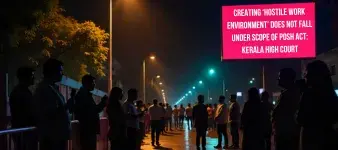
By Anuradha Gandhi and Surbhi Gandotra
The Kerala High Court’s 2025 judgment marks a pivotal development in the jurisprudence surrounding the scope of the Sexual Harassment of Women at Workplace (Prevention, Prohibition and Redressal) Act, 2013, POSH Act in India, drawing a clear line between ‘hostile work environments’ and ‘actionable sexual harassment’ under the statute. This article examines the judgment, analyzes the reasoning of the Division Bench, and contextualizes its implications for workplace anti-harassment framework.
Introduction: Framing the Issue
At its heart, the Kerala High Court’s decision in X v. Abraham Mathai & Ors. (WA 1622/202) addresses ‘whether acts creating a hostile work environment, when not accompanied by sexual conduct, qualify as “sexual harassment” within the meaning of Section 2(n) of the POSH Act’.
The appellant, after termination from employment, alleged treatment that resulted in a toxic work atmosphere but did not claim any sexual advances or inappropriate comments or sexually colored remarks.
Factual Background and Parties
The appellant was an Accountant-cum-Manager at Amstor Information Technology (India) Pvt. Ltd, she was terminated in November 2017.
A complaint was forwarded to the District Collector, who referred it to a Local Committee under the POSH Act.
The Local Committee found for the appellant, ordering the respondent to pay heavy compensation and issue an apology.
Concurrently, the appellant challenged termination before the Labour Court and prevailed, receiving compensation for illegal termination. The respondent sought judicial review, challenging the Local Committee’s jurisdiction, process, and findings before the High Court.
Arguments & Reasoning before Kerala High Court
- Appellant’s Claim: The appellant argued that repeated “unfair and cruel” workplace treatment amounted to sexual harassment, justifying a POSH inquiry and redressal.
- Respondent’s Case: The respondent contended that allegations lacked sexual content and concerned labour disputes does not amount to statutory harassment.
The Division Bench, comprising Hon’ble Mr. Justice Raja Vijayaraghavan V and Hon’ble Mr. Justice K.V. Jayakumar, addressed whether workplace hostility without sexual undertone or advances can fall under POSH.
Legal Standards: POSH Act’s Definition
Section 2(n) of the POSH Act defines “sexual harassment” as including unwelcome acts with sexual content:
- Includes: Physical contact, advances, demands for sexual favours, making sexually coloured remarks, showing pornography, or any other unwelcome physical, verbal, or non-verbal conduct of sexual nature.
- Workplace environment actions qualify only if such acts relate to or are connected with sexual harassment, as per Section 3 of the POSH Act.
The Court found that, in the case before it:
- There was no physical contact, sexual demand, or sexually coloured remarks.
- The complaint’s substance involved termination, denial of salary, abusive managerial behavior, and a discrediting rumor which was not accompanied by sexual overtone.
Court’s Analysis and Findings
The Court held that the behavior in question, although contributing to a hostile work environment, lacked any element of sexual conduct and therefore did not meet the criteria outlined under the POSH Act. It emphasized that the dispute was evidently rooted in a labour-related conflict rather than constituting sexual harassment as defined by the Act.
Referring to Section 3 of the POSH Act, the Bench clarified that only conduct which exploits power dynamics or workplace hierarchies to intimidate with a clear link to sexual harassment falls within its ambit.
Consequently, the Court set aside the Local Committee’s report and reaffirming the distinction between remedies available under labour law and those provided by the POSH Act.
Procedural Irregularities and Natural Justice
The Court also highlighted procedural lapses, directing that: A written complaint, as required by Section 9, was never submitted also reiterated that oral statements were deemed insufficient under the POSH Act
The court also stated that the respondent lacked opportunity to cross-examine witnesses, which results into violation of Rule 7(4) of the POSH Rules and natural justice. The Local Committee’s inquiry, therefore, was unsustainable and ultra vires the statute
Conclusion: Jurisprudential and Practical Significance
The Kerala High Court’s judgment in X v. Abraham Mathai & Ors. Delivers a crucial clarification that: Hostile work environments, unless combined with sexual harassment, fall outside the purview of POSH Act and the hostile work environment without the sexual content falls within the ambit of labour disputes.
The POSH Act is applicable strictly in cases involving sexual behavior or advances, as clearly defined by its statutory provisions. Internal Complaints Committees and HR professionals must invoke POSH mechanisms only when the facts align with these criteria; otherwise, they should pursue remedies under alternative employment laws. The Kerala High Court’s decision not only exposed procedural lapses in the handling of such complaints but also reinforced the principles of natural justice.[1]
[1] X v. Abraham Mathai & Ors., WA 1622/2025, 2025 https://indiankanoon.org/doc/62007746/